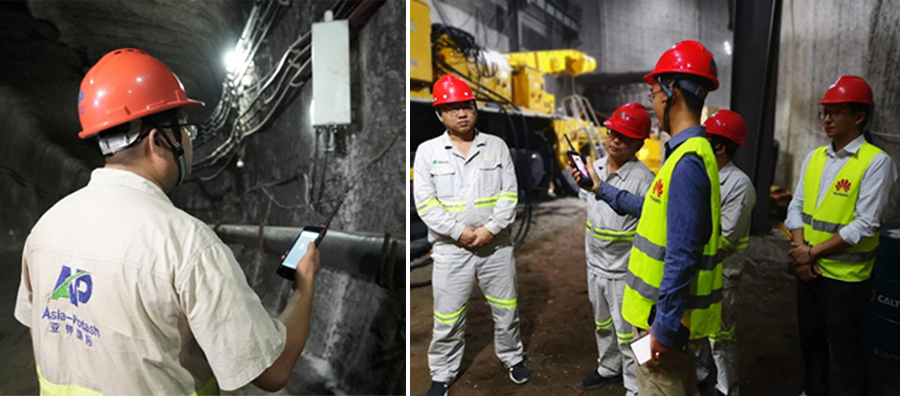A miner made the first WeChat video call 300 meters underground, reporting real-time situation there to the headquarters 3,500 km away in Beijing.
Asia-Potash International Investment is one of the largest potassic fertilizer suppliers in Asia, with one million tons of output in 2022.
Its mining area in Laos is the first smart mining showcase built by the company in Southeast Asia.
It is also the first implementation of Huawei's Smart Mining Solution in Southeast Asia.
With the expansion of production capacity, the number of employees in the mining area in Laos has grown from hundreds to more than 3,000, greatly increasing the demand for automation and intelligence.
Specifically, gaps need to be eliminated in communication above and below ground so that underground production safety can be monitored in real time.
Workers need to be allowed to remotely control mining vehicles in operation rooms above the ground, reducing risks caused by underground operations in harsh environments such as high temperature and humidity.
Intelligent methods need to be used to evaluate ore production quality in real time to improve operation efficiency.
Last but least, the transportation system of underground mining vehicles needs to be flexibly scheduled.
All these cannot be achieved without the powerful basic communication capability supported by a full-coverage industrial network in the mining area.
This is also a rigid requirement for intelligent production in the future.
After over two months of construction, Huawei's Smart Mining Solution is implemented in the mining area, achieving full coverage of wireless private networks above and below the ground, and meeting the requirements of real-time communication between miners and smart inspection for incidents.
This part of the solution is applicable to scenarios where wired networks are unreachable.
On the other hand, wired private networks have also been built, meeting the communication requirements above the ground and the monitoring, operation, and security requirements of the underground production surface and important production facilities.
This part of the solution is applicable to wired scenarios that require high bandwidth, low latency, and massive connections.
According to the head of the smart mine of Asia-Potash International Investment, based on full network coverage and 5G technologies, cloud-edge collaboration, smart mining applications, and underground services that require ultra-large bandwidth or ultra-low latency, such as remote control and autonomous driving, and cannot be implemented on the existing underground private network, will be implemented in the future, laying a solid foundation for building the industrial Internet architecture and people-centric smart mines.
Zhang Lu, a Huawei technical expert, said that fixed phones were mainly used before for communication below and above the ground.
Now, the wireless industrial ring network supports mobile calls anytime and anywhere. In mobile working scenarios, every working unit is connected in real time in the mining area, greatly improving safety and efficiency.
The application of Huawei's Smart Mining Solution fully considers the requirements of network advancement and practicability in mining areas.
One network carries multiple services and supports fast provisioning as well as flexible upgrade to 5G in the future.
Over the past year, Huawei's newly established coal mine team has made great achievements in the field of coal mine intelligence.
The MineHarmony operating system jointly developed by Huawei and China Energy has been deployed in more than 3,300 sets of equipment in 13 coal mines and one coal washing plant of Shendong Coal Group.
The entire Wulanmulun mine applies the operating system.
The transformation of connection, interaction, and data access has been implemented.
In addition, the 5G+AI video stitching technology has been used to implement remote control on some mines.
For example, Sanyuan Coal Mine of Jinneng Holding Shanxi Coal Industry Co., Ltd. has implemented remote control on the comprehensive mining surface, and coal mining drivers have been transferred from underground to above the ground.
The intelligent monitoring of the main transportation belt reduces the number of underground inspection personnel by 20%.
Shenmu Hongliulin Coal Mine of Shaanxi Coal and Chemical Industry Group implements the digital twin of the entire mine.
With the manageable and visualized human-machine ring as well as the construction of all-mine intelligence, the number of underground inspection personnel is reduced by 18% and the output of a single shift increases by 30%.
Coal miners move from underground to above the ground, performing coal mining operations remotely in offices.
This greatly improves the working environment, helping the industry achieve the vision of safe mining with fewer people and high efficiency.
With cutting-edge ICTs that are deeply interwoven with field practices, the Huawei Mine Team has created a mining Industrial Internet platform that runs on unified standards and unified frameworks, and is dedicated to a unified set of data specifications.
By building a next-generation IoT with cloud platforms as the core, data as a key factor, and security as a safeguard, the Mine Team is focused on forging a new mode of applications that integrate next-generation information technologies into the mining sector to forge new modalities for mine companies, supply chain, and the industrial chain.
In this process, the Team will work closely with the sector to unleash new value for the mining industry.
This will help the industry to become safer and more efficient, while requiring fewer people for undesirable and dangerous assignments.
The digital transformation of industries brings both opportunities and challenges.
Huawei looks forward to working with customers and partners in the spirit of openness, innovation, and collaboration.
At the same time, Huawei encourages partners to work together to accelerate digitalization, unleash digital, and provide ever-more impetus for socioeconomic growth.























